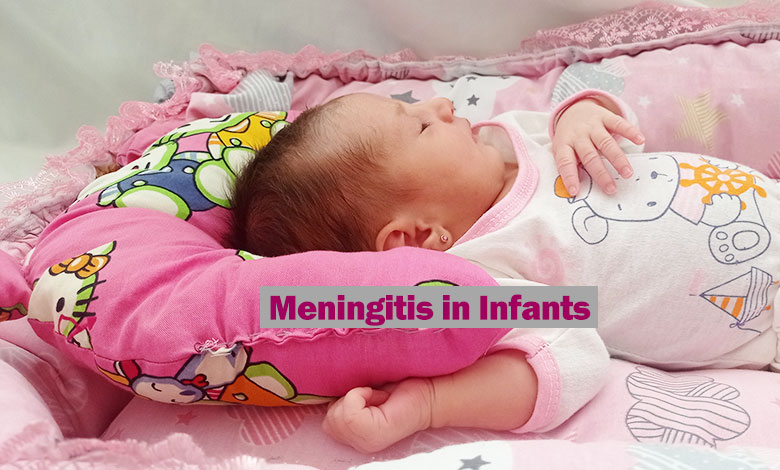Meningitis in Infants

Meningitis is a serious condition that can affect individuals of all ages, but infants are particularly vulnerable. In infants, meningitis is often caused by bacterial or viral infections and can result in severe complications if not treated promptly.
The symptoms of meningitis in infants can be subtle and easily mistaken for other illnesses, which can make diagnosis challenging.
It’s essential for parents and caregivers to be aware of the signs of meningitis in infants, such as fever, irritability, and poor feeding, and seek medical attention if they suspect their child may be affected. Early diagnosis and treatment are crucial in improving outcomes for infants with meningitis.
Viral meningitis
Viral meningitis, whose other name is aseptic, is less dangerous than other types of meningitis, and in most cases, it is treated without the need for medication and only with rest. In many cases, you may not even recognize your child’s viral meningitis or mistake it for the flu. Various viruses may cause viral meningitis. including enterovirus, herpes simplex virus type 2, shingles virus, mumps, etc.
Related posts: ultrasound scan in pregnancy
Bacterial meningitis
Bacterial meningitis is very dangerous and you should not delay its treatment. Bacterial meningitis, if diagnosed early and treated quickly, can be easily treated and will not leave side effects on your baby. Since this type of meningitis has more complications, it needs more serious treatment. Meningitis in babies may cause breathing problems and lack of oxygen, in which case the child should be connected to an oxygen device as soon as possible.
Meningitis in babies can also cause complications such as seizures, and anticonvulsant drugs should be used to prevent the recurrence of seizures. The main treatment for bacterial meningitis is antibiotics, which are usually administered intravenously to the baby in the hospital, and the course of treatment is between 10 and 21 days.
So, in the first step, when you see the symptoms of meningitis in your child, take him to the pediatrician so that the neurologist can diagnose the type of meningitis of your child and prescribe the necessary medicines and medical care for him.
Related posts: Heart Disorders During Pregnancy
Is it possible to completely cure meningitis in babies?
Children who receive prompt treatment make a full recovery. But any delay in treatment leads to irreversible complications. Bacterial meningitis may lead to nerve damage, dementia, mental retardation, hearing or vision loss, movement disorders, and seizures. Also, the heart, kidney, and adrenal glands may also be affected by the infection.
Related posts: Breech Baby: Causes, Complications, Turning & Delivery
After birth, take your child’s vaccination and nutrition seriously.
It is possible that the infectious agent was transferred to the child during the fetal period and the child will carry it after birth, so it is necessary to take his vaccination seriously to reduce the risk of meningitis. Also, breastfeeding is one of the tips that help strengthen the child’s immune system after birth and prepare him to face infectious agents.
If your child is infected with meningitis, the doctor may consider it necessary to prescribe antibiotics or some care measures for you and other relatives of the child.
Meningitis in premature babies
Statistical research shows that neonatal meningitis is more common among babies who are born prematurely. Because these babies have a weaker immune system than other babies and infections affect them more. These babies may get meningitis in the first or second week of their lives. Meningitis symptoms in babies are much less than in children and adults.

The most important symptom that babies show is fever, lethargy and not feeding, sometimes the child’s fever may lead to a seizure and this seizure draws the attention of the parents to the child’s fever.
What is the way to diagnose meningitis in babies?
Any newborn who has an infection in his body after birth should be tested for meningitis. The only sure way to diagnose meningitis in babies is to take cerebrospinal fluid.
In some cases, blood culture, urine culture, blood cell count, and nasopharynx culture can be used to diagnose the cause of meningitis, but the most important thing in the treatment of meningitis is early treatment.
For this reason, in many cases, before the results of the cerebrospinal fluid test are ready, the child is hospitalized and antibiotic treatment is started on him. Delays in the treatment of meningitis may increase the risk of death of the child. Treatment of meningitis lasts between 10 and 21 days depending on its severity.
Some medications can lead to meningitis
Drugs such as ibuprofen, intravenous immunoglobulin, as well as drugs for the treatment of Kawasaki disease, leukemia, lupus (autoimmune diseases), and migraine, can cause complications such as meningitis.
Also, premature babies and babies who are born with a defect in their immune system are more susceptible to meningitis. Hitting the head of babies can also be another cause of meningitis in them.
Does meningitis affect the brain of babies?
Bacterial meningitis may have irreversible effects on infants. This type of meningitis may lead to coma when accompanied by fever. A coma is dangerous for babies and there is a possibility that it will affect their intelligence or put the child at risk of mental retardation.
Meningitis is a very sensitive disease because the meninges are close to the brain and spinal cord. Especially during infancy, late treatment of this disease can have a negative effect on the nervous system and mind of the baby, or cause hearing and movement problems in children.
What to do to prevent meningitis in babies?
Exposure to any virus or infection can put babies at risk of developing meningitis. Contagious infections and viruses can be transmitted to babies through the smallest liquid particles in the mouth or nose of an infected person. It is better not to expose your baby to kissing, sneezing, or the belongings of a person who is infected.
The smallest contact can transfer the contamination to your baby through the child’s mouth or nose. Keep in mind that your baby does not use other people’s dishes, napkins, water glasses, or towels. Also, many of the bacteria that cause meningitis can be prevented with regular vaccinations.
According to tests conducted on a number of premature children, neurologists concluded that lactoferrin, a protein found in breast milk, can greatly reduce the incidence of infection in infants. In this research, premature children who received this protein through a feeding tube had fewer infections than other babies.
How does a baby get meningitis?
Can a baby survive meningitis?
How long do babies live with meningitis?
What does meningitis look like in babies?
Conclusion
In conclusion, meningitis is a serious illness that can have devastating consequences for infants. As parents and caregivers, it’s essential to be vigilant about the signs of meningitis in infants and seek medical attention immediately if there is any suspicion of infection.
With early diagnosis and prompt treatment, many cases of meningitis in infants can be successfully managed, and the risk of complications is minimized. It’s important to work closely with healthcare professionals and follow their recommendations for preventing and managing meningitis in infants, to ensure the best possible outcomes for these vulnerable patients.
